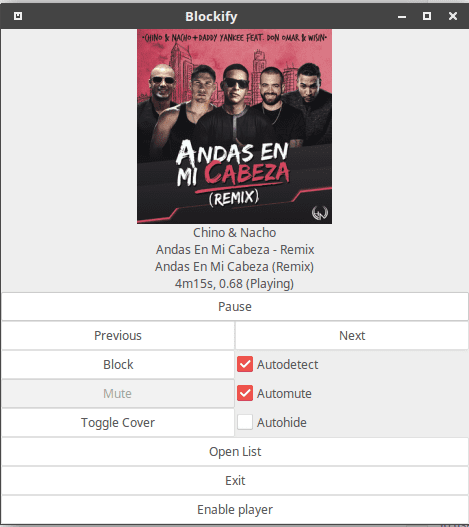On several occasions we have spoken to him about Spotify, the most used digital music service today and that offers us a wide directory of music that we can listen to from any device.
If you still don't use Spotify, you can start installing it by following the guide of Tips to install Popcorn Time, Spotify and Telegram on DEBIAN, in the same way if your desire is to have your own Spotify, you can follow our guide of How to have your own server to stream music.
Spotify has two versions: One Free and one Paid, it is important to note that in the free version of Spotify, it is possible that we hear advertising between songs (radio guidelines, product guidelines or invitation to Spotify Premium). For all those who do not want to hear this publicity, it is born Blockify.

blockify
What is Blockify?
Blockify is an open source tool, developed in Python, which allows you to automatically mute songs and commercials from Spotify. This tool is the only one of its kind compatible with GNU / Linux.
This tool is based on dbus and it is recommended to use it with PulseAudio, in the same way its use is automatic, but it also has a graphical interface that allows you to perform various functions.
How to install Blockify?
For Blockify work we must definitely have Spotify installed (It seems obvious but just in case), then it is important to comply with the dependencies, below we show you how to install Blockify on Arch Linux, Fedora, Opensuse and any other distribution.
Install Blockify dependencies
You can install the dependencies in Linux Mint in the following way:
# Install blockify dependencies
sudo apt-get install git python3-pip python3-gst-1.0 python3-requests python3-docopt python3-setuptools wmctrl
Install Blockify on Arch Linux and derivatives
AUR package is available here
$ yaourt -S blockify
You can also install it directly from the repositories, using the following commands:
git clone https://aur.archlinux.org/blockify.git
cd blockify makepkg -sri
Install Blockify on Fedora, openSUSE and derivatives
You can get the necessary packages from the openSUSE build service.
Install Blockify Manually using (pip / setup.py)
We must execute the following commands from our console:
# Install blockify
sudo pip3 install git + https: //github.com/serialoverflow/blockify
threw out -e '[Desktop Entry] \ nName = Blockify \ nComment = Blocks Spotify commercials \ nExec = blockify-ui \ nIcon ='$(python3 -c 'import pkg_resources; print (pkg_resources.resource_filename ("blockify", "data / icon-red-512.png"))')'\ nType = Application \ nCategories = AudioVideo' | sudo tee /usr/share/applications/blockify.desktop
How to use Blockify?
Just run Blockify for it to start blocking Spotify ads automatically. But in the same way you can make personalized use of the application using the graphical interface, where we can pause, fast forward, silence, insert selective locks, among others.
jojojojo I have to share this !!! thank you very much!!! 😀
Buy the blessed premium…. If you organize with some people you create the family package. I literally pay only 1.50 dollars a month. The truth is that there is no excuse for things like this to exist. Spotify gives you free legal music, an application for pc to have your songs and playlist organized and such. Keep promoting this and you will see how the free version dies.
Yes and no, if you are right. Not because it is proprietary software, what a dilemma.
I pay Spotify what if I don't pay is Netflix. I prefer Popcorn
It works perfectly!!!! Ubuntu 14.04
Thanks a thousand and a thousand 😀 😀
thank you…
ce n'est pas python3-requêtes mais python3-requests